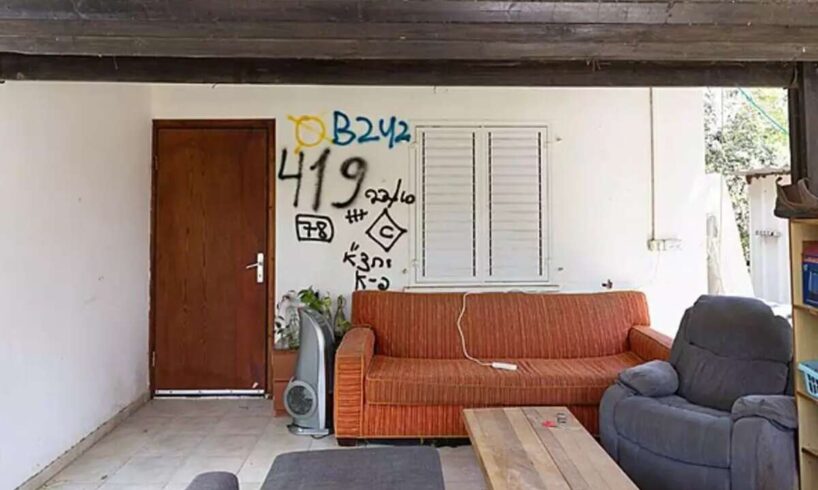
This was the home of Beni and Yamit Avital, a couple in their 40s, with three children: Saar, 10, Adi, 8, and Yoav, 5.
Before October 7, 2023, life here was peaceful, almost idyllic. Simple days surrounded by nature and fields. A life of openness and tolerance, with no fear, grounded in the belief that both sides longed to live quietly and in peace. Bicycles were the main way of getting around. Community gatherings built a close-knit and caring kibbutz spirit, and volunteerism flourished.
On October 6, the children slept outside in the sukkah. A friend of Saar’s joined, and there was complete safety, even at night. Yamit had gone to Tel Aviv with friends, while Beni stayed to watch the kids.
The next morning, when the sirens blared, the children ran into the home’s reinforced safe room. They stayed inside for hours of terror.
Beni, a member of the kibbutz’s emergency squad, was summoned when word came that terrorists disguised in IDF uniforms had infiltrated. But he could not leave; his duty was to protect his children. Listening closely to squad messages, he realized the situation was detiorting rapidly. Meanwhile, Yamit followed the mothers’ and kibbutz WhatsApp groups, desperately trying to summon help.
At 9:15 a.m., a squad of Hamas Nukhba terrorists entered the house while Beni and the children hid inside the safe room. The door did not lock. Beni had to use all his strength to grip the handle and keep it shut as the terrorists tried to break in. They ate, drank, used the bathroom, and tried repeatedly to force the door open. After 40 agonizing minutes, they left. For a moment, relief.
By then, communication had already collapsed, leaving Yamit with no way to know if her family was alive.
At 10 a.m., another squad stormed the house. For two hours, they again tried to break into the safe room while Beni clung to the handle. They banged on the door, shouting in Arabic and Hebrew: “Happy holiday,” “Open up.” Behind the cupboard, the children trembled, with Saar and his friend wrapping their arms around Adi and Yoav, trying to calm them.
The terrorists ransacked the house, looted everything, and prepared it for arson. They piled canned goods, dolls, and books against the safe room door, ready to set it alight. Outside, there was laughter, singing, smoking, eating – a grotesque celebration.
At noon, Beni heard one of them say “Yalla, yalla” before they finally left. Cell service returned. He messaged Yamit: “We survived. The children were heroes.”
At 12:40 p.m., their neighbor, Adi Negev, entered and confirmed no terrorists remained inside. Shortly after, Beni received a call from Eran Smilansky, asking for help rescuing the Kunio family, trapped in their burning safe room. Adi stayed with the four children while Beni rushed out to save others in the kibbutz.
By 3:30 p.m., the IDF evacuated the children to the kibbutz command center, where they reunited with survivors, starting to comprehend the magnitude of the massacre.
At midnight, Beni learned that his older brother, Gil Avital, had been killed in battle with other members of the emergency squad between Moshav Yesha and Moshav Mivtahim. The next day, Yamit met the family at Lotan Junction on Route 90 as they headed south, to Eilat.
Today, the Avitals live in Karmey Gat with the displaced Nir Oz community. Beni has returned to work as a project manager at Tnuva, and Yamit works in children’s movement therapy in schools and with an NGO supporting veterans with PTSD. Saar, Adi, and Yoav are in school, trying to live, smile, laugh, and travel despite the trauma.
By the end of that black day, October 7, the scale of the atrocity became clear: One in four residents of Nir Oz had been murdered or abducted. In all, 117 people – children, elderly, women, and men – were killed or kidnapped, over a quarter of the kibbutz’s population.





